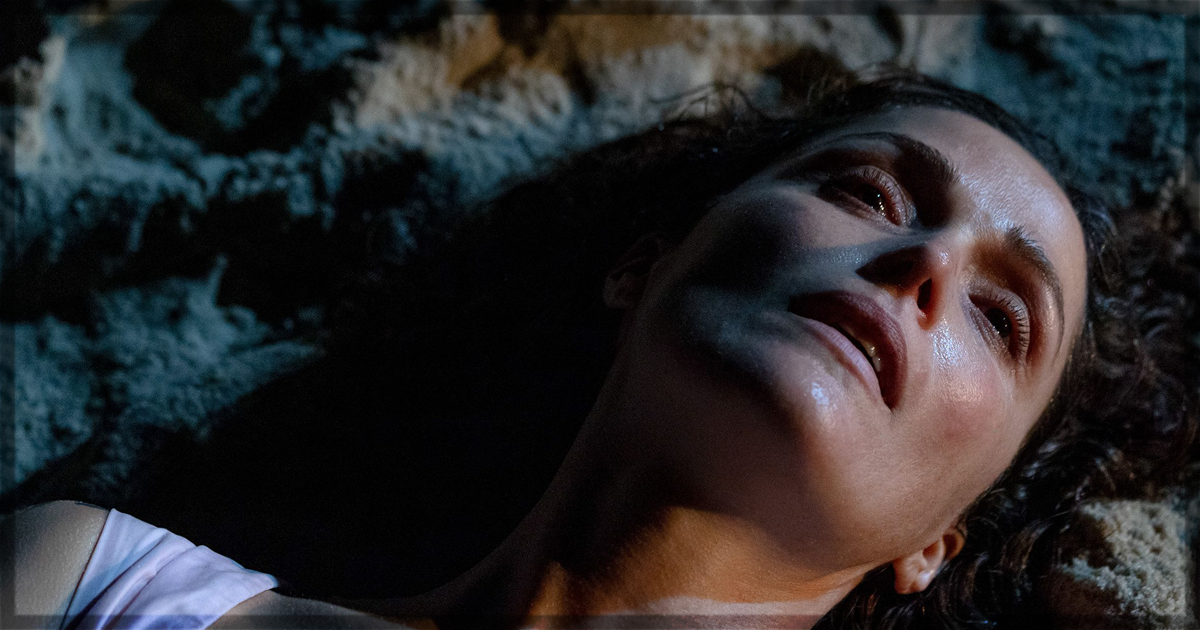Rose Byrne’s magnificent performance grounds this takedown of modern motherhood (not parenthood) under capitalism, but If I Had Legs I’d Kick You is really about the flaws of modern American society. Its unmissable message is that America is completely ruled by its addictions and its impossible desire to get without giving. This me-first attitude is completely incompatible with looking after little children, especially if those little children have the nerve to be imperfect or unwell in some way. It’s a nasty watch, but one with an insight into American culture that perhaps it didn’t realise it has.
Linda (Ms. Byrne), whose name is only provided in the credits, has a child (Delaney Quinn) around seven who’s so unwell that she’s not in school and instead spends her days at a hospital clinic. The hyperarticulate child, whose name is never mentioned and whose face is not shown until the very end, has such serious anxiety among other problems that she refuses to eat and therefore must be fed by a tube as she sleeps. This would be difficult enough to cope with at the best of times, but the family’s apartment has been badly damaged by a broken pipe from upstairs and therefore Linda and the child are staying in a motel a few blocks away, on the Long Island seafront. Linda’s husband is away (more on which later), and she works as a therapist for a variety of patients she cannot stand. She has therapy herself with a colleague (played by talk show host Conan O’Brien, a fascinating casting choice) who maintains strict professional limits, which Linda finds infuriating. At night she leaves her daughter alone in the motel room with a baby monitor to smoke and drink in angry secret, which does not impress her new next door neighbour Jamie (A$AP Rocky, clearly working on a career pivot). But Jamie, a bored and friendly young black man, is the only person who offers Linda something instead of just wanting something for himself. The doctors at the hospital want Linda to participate in group therapy, Linda’s husband (Christian Slater) is relentlessly critical over the phone, and her neediest patient Caroline (Danielle Macdonald) is in a personal situation so close to her own that Linda reacts to her mainly with judgemental anger. And then things get much, much worse.
When Linda’s husband does eventually show up, he is in a (sloppy and inaccurate) Navy uniform. This rather begs the question as to why a family of such military seniority isn’t living in military housing or using military health care. But the choice of the uniform was clearly to demonstrate not only that Linda’s husband has responsibilities above and beyond that to his family, but also that he has a network of support around him which for whatever reason has not included his family. Once again – as in Nightbitch, as in Die My Love – we have a movie about motherhood where a struggling married mother has absolutely no family or friends and her husband, not the father, has it all. But even in the unlikely event a military spouse of that longevity would so completely reject the military lifestyle and mindset that the audience learns of it from a costume choice, Linda is not alone. She doesn’t like them but she has colleagues with a wary eye on her, and she even has Jamie, who seems to be interested in her her for her own sake, not because he wants something. The worst part of the rampant selfishness on display here is not how Linda resents her daughter, hates her husband, or has no compassion for her patients. It’s that she sees Jamie’s kindness only as an excuse to manipulate him for herself. He is also the only black person in the movie, and once again American cinema has got to ask itself if “emotional support to white people” is what black people are there for.
But if we set aside that impact of writer-director Mary Bronstein’s casting choice, and if we ignore the fact that Ms. Bronstein named her heroine after her own mother, we are still looking at a picture of American motherhood where the two choices seem to be to erase yourself completely to the whims of your irritating child or turn into Andrea Yates. There is actual police interrogation footage of Mrs Yates – who murdered her five children during a psychotic break in 2001, although anyone who remembers the trial will have quite a lot to say about her husband’s behavior – shown on screen, in addition to a clip of Yoselyn Ortega, the mentally unwell nanny who killed two small children in New York City in 2012 and whose spectre seemingly haunts every American woman who is even thinking about maybe someday having a baby. (In the London film festival screening I attended, no one else seemingly recognised either woman but me, a cultural lacunae people in Europe should be extremely proud of.)
The fact is that parenting is a team sport, but Americans no longer believe in teamwork. They believe that individuals must stand or fall on their own and if assistance is needed it should be bought. What’s more, under this attitude, when assistance is bought they have the total right to dictate the terms. That’s why Linda’s patients don’t greet her and are so rude when they are asked to wait. Linda even tells her own therapist that she has bought his time and therefore she gets to dictate the terms of their sessions. Apparently her husband has bought her services as a wife, in the same way Caroline’s partner has clearly bought her services as a mother. Whereas Jamie values his own time and kindness so little he’s prepared just to give it away. In that case, who wouldn’t take advantage? This is why the awful case of Ms. Ortega is so deeply embedded into the American psyche: in this mindset, her crime was not committed against the children whose lives she ended, but against the mother who hired her help.
In a society this awful, why become a mother in the first place? The answer seems to be that it’s the only way to experience true love. Angry, critical, cruel husbands who leave you alone and take time for themselves certainly don’t provide it. But even the magnificence of capitalism cannot guarantee you get the child you want. Like the biting hamster in the movie’s most darkly funny sequence, Linda’s child is too much of a child to appreciate what’s she’s got. And yet she did not ask to be born, and therefore no child should be expected to pay for their parent’s care except in loving them for it. It’s very difficult to feel the depth of the rage directed at her, the person least responsible for it.
All that said, Christopher Messina’s clever cinematography does a wonderful job of framing the trap Linda feels herself in and magnifying her relentless sense of dread, and Ms. Byrne holds the movie together completely as a woman on the very last edge of her very last nerve. But my goodness If I Had Legs I’d Kick You is hard to watch, so hard that its insights into the current American moment risk being lost.
If I Had Legs I’d Kick you recently played at the London International Film Festival.
Learn more about the film at the IMDB site for the title.


